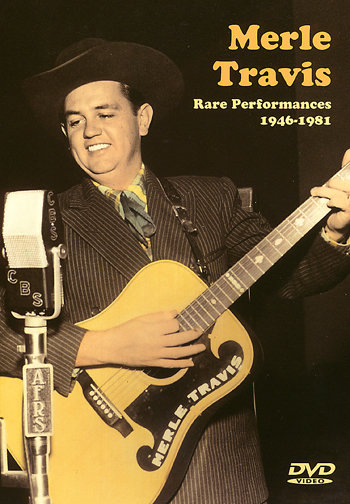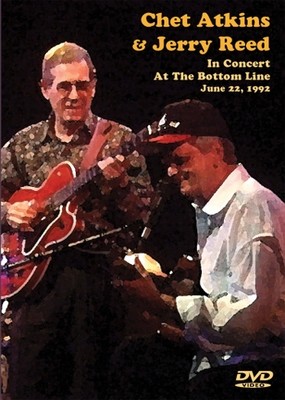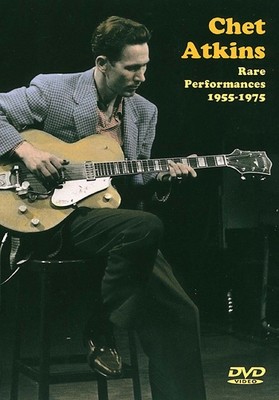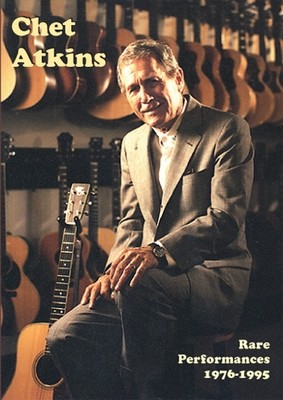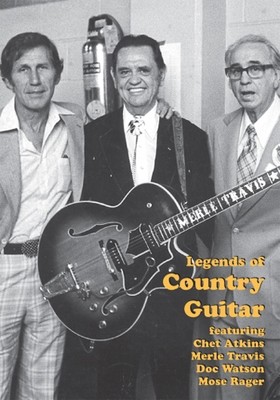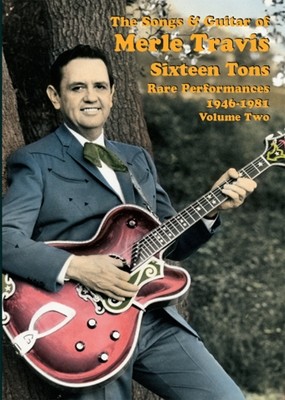
Merle Travis- Rare Performances 1946-1981
"Merle Travis could write you a hit song and sing it; he could draw you a cartoon; he could play you a great guitar solo; or he could fix your watch. . . . I'd probably be looking at the rear end of a mule if it weren't for Merle Travis. ... If you can say there is a certain style to my way of playing, then you have to recognize it as the influence of the guitar pickin' of Merle Travis." - Chet Atkins
Merle Travis (1917-1983) was the fountainhead of a blues/jazz tinged country guitar fingerstyle since dubbed "Travis picking." Its impact has permeated not only country but folk and "roots rock" guitar idioms. Travis's seminal role in American guitar styles overshadows the fact that he was also a formidable talent as a songwriter and performer. The many facets of his career are all present in these two videos spanning his west coast post-war prime to his last days as a rediscovered legend.
This DVD captures thirty-five years of rare film and television performances.
Titles include: No Vacancy, Nine Pound Hammer, Mus'rat, I'm a Natural Born Gamblin' Man, Too Much Sugar For a Dime, Spoonin' Man, Lost John, Dark as a Dungeon, Petticoat Fever, Sweet Temptation, John Henry, I'll See You In My Dreams, Midnight Special, Cannonball Rag, I Am a Pilgrim, Sixteen Tons, Smoke Smoke That Cigarette, Barbeque Rag.
Running Time: 60 minutes
Review: A gold mine for Merle Travis fans and a potential revelation to newcomers, this video is an excellent showcase for one of America's greatest fingerstyle guitarists. Travis' guitar style traces back through Ike Everly and Mose Rager, two local favorites in Muhlenberg County, Kentucky, to Arnold Schultz, the black multi-instrumentalist best known for his influence on Bill Monroe. Travis added some fancier chording and harmonies to the Kentucky style, while keeping the easy, loping bass of the older players. This video includes his most familiar numbers Nine Pound Hammer, Dark As A Dungeon, I Am A Pilgrim, Smoke, Smoke That Cigarette and Sixteen Tons, along with 13 other songs and instrumentals.
Starting with a lip-synched short from 1946, the video goes into 10 pieces from 1951. Half are solos, drawn from Travis' 1947 "Folksongs of the Hills" album, and include his folksy introductions. His picking is clean and expert, his singing is simple and pretty, and his big smile and aw-shucks manner are charming, if a bit hokey.
The next six numbers show Travis solo on various TV shows between 1960 and 1977. Two instrumentals, a somewhat syrupy I'll See You In My Dreams and a devastating Cannonball Rag, should send all the guitar players back to the woodshed for a while. Travis is at his most relaxed and charming on Austin City Limits, mimicking Chet Atkins and joking about his vocal limitations, while playing beautifully. Two 1981 instrumental duets with Thom Bresh provide an appropriate finish.
The enclosed booklet has a biography by Mark Humphrey and a long interview with Travis, which fills in the background to his life and music. All in all, this is the sort of no-frills career retrospective that we need a lot more of. This is the best Merle Travis set on the market. - Sing Out!
Review: Merle Travis comes immediately to mind when one thinks of successful country artists who've had a major impact on old-time music. He carried his Kentucky folk music traditions with him all the way to Hollywood, where he carved out an enviable career on radio, records and occasional films in the late 1940s.
Though he was a congenial entertainer, competent songwriter and passable singer, Travis made his greatest mark at least amongst musical colleagues as a guitarist. His sophisticated thumb and finger techniques recalled early banjo music, while simultaneously inspiring a range of young progressive guitarists from Hank Thompson to Chet Atkins (who's quoted "l'd probably be looking at the rear end of a mule if it weren't for Merle Travis"). In bluegrass, Travis picking has left its mark on Charlie Cline, Joe Meadows, Eddie Adcock, John Duffey, Carl Jackson, and Earl Scruggs, among others.
Merle's self-composed trademark hits of the 1940s on the Capitol label included "So Round, So Firm, So Fully Packed" (inspired by a cigarette ad campaign), "Divorce Me C.O.D.," "Sweet Temptation" and, later, "Re-enlistment Blues" (from the 1953 film From Here To Eternity). "Smoke, Smoke, Smoke That Cigarette," another huge Travis hit, was recorded for Capitol by Tex Williams. While one hot single was succeeding another in 1946-8, Capitol had Merle record a number of tunes for distribution through its radio transcription service. Many were made with a full cowboy band; others were unpretentiously introduced and performed by Merle alone, with an acoustic guitar.
A Capitol producer (Lee Gillette and Cliffie Stone have both been cited) then came up with the notion of a Travis "folk song" album, using the voice and guitar format of the transcriptions. Merle demurred, claiming that he didn't know any folk songs. When encouraged to write a few himself, he finally agreed. The album, "Folk Songs Of The Hills" (Capitol AD50), was recorded in August 1946, and released the following June, after one song was remade.
Merle Travis grew up in the semi-impoverished coal region of Muhlenburg County, Ky., in the 1920s and 1930s, inheriting many songs and his fabled picking style from Ike Everly, Mose Rager, and through them from an African American instrumental legend named Arnold Shultz (who also left his mark on another young Kentuckian, Bill Monroe). The album contained several coal mining songs, and became an unstated tribute to them all.
Travis probably misrepresented the case when he later recalled that the "Folk Songs" album had negligible commercial impact. Though it didn't rival the enviable success of his singles, the set did include versions of "Nine Pound Hammer," "That's All," "I Am A Pilgrim" and "John Henry," which were copied by countless others. To those, Merle added his own "Over By Number Nine," "Dark As A Dungeon" and "Sixteen Tons;" the latter two became his most enduring songs of all, eventually even eclipsing his hits of the time.
Following the extraordinary success of Tennessee Ernie Ford's 1955 cover of "Sixteen Tons" (Capitol 3262), the label reissued "Folk Songs Of The Hills" on a 12" LP "Back Home" (T 891, reissued on Bear Family BCD 15636) in 1957, filling out the set with four additional songs selected from the transcriptions. Its success inspired a primarily guitar solo LP, "Walkin' The Strings" (T 1391), made up from yet more 1940s transcription cuts. This impressive video offers several visual encores from "Folk Songs" and the transcriptions, taken primarily from some low budget 1951 "soundies," made for distribution by Snader Telescriptions in Hollywood. Some clips feature a full band, with appearances by steel guitarist Speedy West, fiddler Harold Hensley and rhythm guitarist Eddie Kirk. Others are solo versions of several of the 1946 Folk Songs. "Sixteen Tons" is conspicuously absent in 1951; Merle apparently didn't care much for the song at the time. The 1977 version (which includes a hilarious and self-effacing anecdote about Chet Atkins) ends ruefully and humorously with bl o-o-o-owe my soul to Tennessee Ernie Ford!"
The "folk songs" and jukebox tunes all showcase the Travis technique when the artist was 34 and still close to the top of his form. The cameras occasionally point in the wrong direction during a juicy lick, but they're usually focused where they're supposed to be, revealing "Travis-picking" in all its considerable glory, and the many novel ways the artist had of picking, fretting, choking and nurturing his instrument.
Later clips are from the Ozark Jubilee (1960), the Porter Wagoner Show (1968-71), Austin City Limits (1977), and Nashville Swing (1981). A series of strokes beginning in the late 1960s took their toll on Merle's music, but never to the point of making it unlovely or uninteresting. He wasn't afraid to try his Cannonball Rag in 1970, a test piece which everyone in western Kentucky with aspirations to finger-style guitar tried to master. Though this doesn't quite compare with the rip-snorting versions made on transcription in 1945 (Capitol G-11, reissued on LP T 1391) and in 1952 (Capitol 2245), it]s close enough to enjoy and study. A lovely guitar arrangement of I'll See You In My Dreams also comes from Merle's early days.
Merle Travis is arguably one of the guitar giants of the century. Everyone who's heard his best music knows what the fuss was all about; this video offers a rare opportunity to see it as well. A further bonus is the 36-page booklet included with the tape, with a number of vintage photos, a good biography and a 1979 interview of Travis, both by compiler Mark Humphrey. – Bluegrass Unlimited
